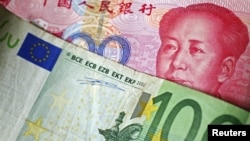Two of the world's biggest economies - China and the 17-nation euro currency bloc - are cutting key lending rates in a new effort to boost their flagging economic fortunes.
The Chinese central bank Thursday cut its benchmark lending rate for the second time in a month, signaling that the world's second largest economy is slumping and faced with its biggest economic challenge since the 2008 worldwide recession. Beijing trimmed its one-year lending rate by nearly a third of a percentage point to 6 percent and said banks could offer even steeper discounts to borrowers.
China has offered numerous stimulus measures after its economic output dropped to a three-year low of 8.1 percent in the early months of the year. It has cut gasoline prices and promised more spending on low-cost housing and other public projects.
Meanwhile, the European Central Bank cuts it key lending rate to a record low - down a quarter of a percent to three-quarters of one percent - as the eurozone economy contracts slightly.
In addition, the Bank of England moved to boost the British economy, which is outside the eurozone but deeply dependent on trading with its European neighbors. The British central bank pumped $78 billion into the country's recession-hit economy.
European Central Bank Chief Mario Draghi said inflation has stabilized in the eurozone at just below 2 percent, but economic growth in the region remains sluggish. "Inflationary pressure over the policy-relevant horizon has been dampened further as some of the previously identified downside risks to euro area growth outlook have materialized," he said.
"Consistent with this picture, the underlying base of monetary expansion remains subdued" he said. "Inflationary expectations for the euro area economy continued to be firmly anchored in line with our aim of maintaining inflation rates below, but close to two percent over the medium term," added Draghi. "At the same time, economic growth in the euro area continues to remain weak with heightened uncertainty weighing on confidence and sentiment."
The precarious financial state of debt-ridden Greece continues to be one of the eurozone's biggest economic problems. International auditors are in Athens to look at the government's progress in meeting the austerity pledges it agreed to as it secured a $168 billion bailout earlier this year, its second rescue package in two years.
New Greek Finance Minister Yannis Stournaras told reporters that some of the spending cuts it promised are "off track" and that the country faces "difficult years" in its recovery effort.
The Chinese central bank Thursday cut its benchmark lending rate for the second time in a month, signaling that the world's second largest economy is slumping and faced with its biggest economic challenge since the 2008 worldwide recession. Beijing trimmed its one-year lending rate by nearly a third of a percentage point to 6 percent and said banks could offer even steeper discounts to borrowers.
China has offered numerous stimulus measures after its economic output dropped to a three-year low of 8.1 percent in the early months of the year. It has cut gasoline prices and promised more spending on low-cost housing and other public projects.
Meanwhile, the European Central Bank cuts it key lending rate to a record low - down a quarter of a percent to three-quarters of one percent - as the eurozone economy contracts slightly.
In addition, the Bank of England moved to boost the British economy, which is outside the eurozone but deeply dependent on trading with its European neighbors. The British central bank pumped $78 billion into the country's recession-hit economy.
European Central Bank Chief Mario Draghi said inflation has stabilized in the eurozone at just below 2 percent, but economic growth in the region remains sluggish. "Inflationary pressure over the policy-relevant horizon has been dampened further as some of the previously identified downside risks to euro area growth outlook have materialized," he said.
"Consistent with this picture, the underlying base of monetary expansion remains subdued" he said. "Inflationary expectations for the euro area economy continued to be firmly anchored in line with our aim of maintaining inflation rates below, but close to two percent over the medium term," added Draghi. "At the same time, economic growth in the euro area continues to remain weak with heightened uncertainty weighing on confidence and sentiment."
The precarious financial state of debt-ridden Greece continues to be one of the eurozone's biggest economic problems. International auditors are in Athens to look at the government's progress in meeting the austerity pledges it agreed to as it secured a $168 billion bailout earlier this year, its second rescue package in two years.
New Greek Finance Minister Yannis Stournaras told reporters that some of the spending cuts it promised are "off track" and that the country faces "difficult years" in its recovery effort.
Some information for this report was provided by AP, AFP and Reuters.










